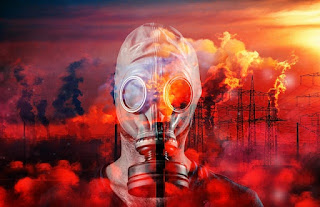
What is Pollution and How Does It Impact Our World?
Pollution is a term we hear almost every day, but what does it really mean? Simply put, pollution occurs when harmful substances—known as pollutants—are introduced into the environment, causing damage to the air, water, soil, or living organisms. These pollutants can come from various sources, including factories, vehicles, waste disposal, and even household activities. But how does this affect us, and what can we do about it?
Types of Pollution
Pollution can take many forms, but the most common types are:
1. Air Pollution: This is when harmful gases, dust, or smoke enter the atmosphere, making the air we breathe dangerous. The main culprits include emissions from vehicles, factories, and the burning of fossil fuels. Air pollution is linked to respiratory problems, heart disease, and even climate change due to the increase in greenhouse gases.
2. Water Pollution: This occurs when harmful substances—such as chemicals, waste, or plastics—enter our water bodies like rivers, lakes, and oceans. Water pollution can lead to the destruction of aquatic ecosystems, the poisoning of drinking water supplies, and the disruption of the food chain.
3. Soil Pollution: This type of pollution happens when chemicals, waste, or heavy metals seep into the ground, contaminating the soil. This can lead to the loss of fertile land, making it difficult for crops to grow and harming animals that rely on the land for food.
4. Noise Pollution: Often overlooked, noise pollution is caused by loud sounds from traffic, construction, or industrial activities. While it may not be visible, noise pollution can lead to stress, hearing loss, and disturbances in wildlife habitats.
Real-Life Examples of Pollution
To understand pollution better, let’s look at a few real-world examples:
- The Great Smog of London (1952): This deadly smog was caused by the burning of coal in homes and factories, combined with cold weather. The smog was so thick that it reduced visibility and led to thousands of deaths due to respiratory problems.
- The Deepwater Horizon Oil Spill (2010): One of the worst oil spills in history, this disaster released millions of barrels of oil into the Gulf of Mexico, severely affecting marine life and coastal ecosystems.
- Plastic Pollution in the Oceans: Today, millions of tons of plastic waste are floating in our oceans, harming marine animals who mistake it for food. This pollution also affects the fishing industry and the health of our oceans.
The Role of Pollution in Our Self-Sustainable City Project
In our self-sustainable city project, pollution control is a top priority. By integrating green building practices, using renewable energy sources like solar and wind, and promoting waste reduction through recycling and composting, we aim to minimize pollution in all its forms. For example, our homes are designed with energy-efficient systems to reduce emissions, and we use natural farming techniques that avoid harmful chemicals, preserving the health of our soil and water.
By addressing pollution head-on, we create a healthier environment for everyone in our community. But we can't do it alone. We encourage you to share your thoughts or ask questions in the comments—let’s work together to build a cleaner, greener future!
![Self-Sustainable City - Ramakrishna Surathu [Official Website]](https://blogger.googleusercontent.com/img/a/AVvXsEivh2bAyNCG-DxYf4p_lHLcFQx1i8MvbBv91UgzKqAFrNMhT8xW-fwxgNJTdtojgb9aYXiG9EdNYLo8tNmtaakyq-zmnaCeeUGMdpvJ8iOaVzd2tSKEC2UrUXzFJa952LPF-OngfPenpbFOj7b8AcbYtPGSng6xbGr-_NwEIRpXZg_QdKLGRMGeg5pWmtaQ=s1280)
No comments:
Post a Comment